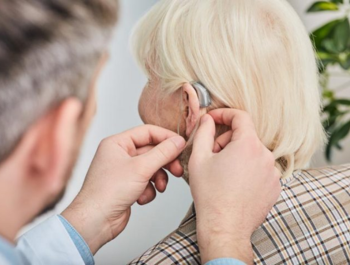
The Link between Hearing Loss and Dementia
30 November 2022
Adults with hearing loss are at a higher risk for Dementia and cognitive decline.
The risk of Dementia increases for those with a hearing loss greater than 25 dB (Lin FR, Albert M, 2014).
Individuals with moderate to severe hearing loss are up to 5 times as likely to develop dementia.
According to several major studies (Livingston et al, 2020) older adults with hearing loss—especially men— are more likely to develop dementia, compared to those with normal hearing. Men with hearing loss were 69 percent more likely to develop dementia than those with no hearing impairment (Ford et el 2020).
The risk escalates as a person's hearing loss worsens. Those with mild hearing impairment are nearly twice as likely to develop dementia compared to those with normal hearing. The risk increases three-fold for those with moderate hearing loss, and five-fold for those with severe impairment (Lin FR, Albert M, 2014).
Hearing loss linked to Dementia—what’s the connection?
Studies suggest that hearing loss causes brain changes that raise the risk for dementia (Pereira-Jorge et al, 2018).
Brain shrinkage — When the “hearing” section of the brain grows inactive, it results in tissue loss and changes in brain structure—creating the first link between hearing loss and Dementia.
Studies show that the brains of people with hearing loss shrink—or atrophy—more quickly than the brains of people with normal hearing.
Brain overload — An “overwhelmed” brain creates the second link between hearing loss and dementia. When it’s difficult to hear, the brain must work overtime just to understand what people are saying. Straining to hear all day, every day, depletes a person’s mental energy and steals brain power needed for other crucial functions like remembering, thinking, and acting. This can further set the stage for Dementia and other cognitive disorders.
Hearing aids may help to slow the progression of dementia and cognitive decline.
Numerous studies show that hearing aids not only improve a person’s hearing—they also help preserve a person’s independence, mental abilities, emotional and physical health, and work, home, and social lives. A full, happy life keeps your brain active.
Early identification and treatment of a potential hearing loss helps minimise risks later in life.
References
Ford, Andrew H, Graeme J. Hankey, Bu B. Yeap, Jonathan Golledge, Leon Flicker, Osvaldo P. Almeida, (2018) Hearing loss and the risk of Dementia in later life, Maturitas, Volume 112,
Lin FR, Albert M. Hearing loss and dementia - who is listening? Aging Ment Health. 2014;18(6):671-3. doi: 10.1080/13607863.2014.915924. PMID: 24875093; PMCID: PMC4075051.
Livingston G, Huntley J, Sommerlad A, Ames D, Ballard C, Banerjee S, Brayne C, Burns A, Cohen-Mansfield J, Cooper C, Costafreda SG, Dias A, Fox N, Gitlin LN, Howard R, Kales HC, Kivimäki M, Larson EB, Ogunniyi A, Orgeta V, Ritchie K, Rockwood K, Sampson EL, Samus Q, Schneider LS, Selbæk G, Teri L, Mukadam N. ( 2020) Dementia prevention, intervention, and care: 2020 report of the Lancet Commission. Lancet. 2020 Aug 8;396(10248):413-446. doi: 10.1016/S0140-6736(20)30367-6. Epub 2020 Jul 30. PMID: 32738937; PMCID: PMC7392084.
Pereira-Jorge, M.R., Andrade, K.C., Palhano-Fontes, F., Diniz, P.R., Sturzbecher, M.J., Santos, A.C., & Araujo, D.B. (2018). Anatomical and Functional MRI Changes after One Year of Auditory Rehabilitation with Hearing Aids. Neural Plasticity, 2018.
Contact us for more information or an appointmentRead more
 The sound of change: Bellbird Hearing.
The sound of change: Bellbird Hearing.
 Understanding Tinnitus: Breaking the Silence for Tinnitus Awareness Week.
Understanding Tinnitus: Breaking the Silence for Tinnitus Awareness Week.
 You are unique - your hearing solution should be too!
You are unique - your hearing solution should be too!
 Diabetes and Hearing Loss: Understanding the Connection
Diabetes and Hearing Loss: Understanding the Connection
 Tips for Enhanced Communication and Frequently Asked Questions
Tips for Enhanced Communication and Frequently Asked Questions
 Client testimonial - Tiffany
Client testimonial - Tiffany
 Self Help Guide for Tinnitus Relief Now Available Around the World
Self Help Guide for Tinnitus Relief Now Available Around the World
 Why do I need two hearing aids?
Why do I need two hearing aids?
 4 years of happy ears: Bellbird Hearing
4 years of happy ears: Bellbird Hearing
 Client Testimonial - Colin
Client Testimonial - Colin
 Personalised hearing support: Bellbird Hearing
Personalised hearing support: Bellbird Hearing
 Understanding Sudden Sensorineural Hearing Loss: What You Need to Know
Understanding Sudden Sensorineural Hearing Loss: What You Need to Know
 Hear here: Bellbird Hearing
Hear here: Bellbird Hearing
 Track Testing Motorsport Earplugs at the SCOPE Classic
Track Testing Motorsport Earplugs at the SCOPE Classic
 Tips for hearing in background noise
Tips for hearing in background noise
 Communication Strategies
Communication Strategies
 Sound Solutions: Embracing the Future of Hearing Aids in 2023
Sound Solutions: Embracing the Future of Hearing Aids in 2023
 Keeping the hearing required to run a company - John Baker’s Story
Keeping the hearing required to run a company - John Baker’s Story
 Noise induced hearing loss
Noise induced hearing loss
 Do you have itchy ears?
Do you have itchy ears?
 The gift of hearing
The gift of hearing
 Waxing lyrical about hearing
Waxing lyrical about hearing
 Hear to stay: Bellbird Hearing
Hear to stay: Bellbird Hearing